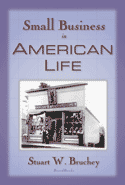|
|
|
|
||||||

|
Small Business in American Life
By Stuart W. Bruchey (Editor) 2003/07 - Beard Books 158798184X - Paperback - Reprint - 402 pp. US$34.95 "This is an excellent and much needed collection on a relatively neglected aspect of American economic life…It is an exceptionally effective presentation." --- Canadian Journal of History, Vol. 16 (1981) Publisher Comments
This volume contains seventeen scholarly essays that provide insights into the role small business has played in United States history, particularly in manufacturing, retail, and banking. The essays show how small business has formed an integral part of American life. Its influence was not confined to the economic sector, but also affected social mobility, urban power structures, the legal system, and the formation of values shared by Americans. The breadth of this approach ensures engrossing reading. From Turnarounds and Workouts, June 15, 2004 This collection of seventeen essays, mostly by professors of history or economics, were written at the invitation of Bruchey to compose an "American Report" during the International Commission on the History of Social Movements and Social Structures convened in Bucharest, Romania, in 1980. Bruchey's twenty-seven page "Introduction" constitutes the Report he delivered, while the seventeen essays are included as they were submitted to him to enable him to create the overall Report. Bruchey's Report and the supporting essays reflect the American view that small business is a special, much-valued opportunity offered by American society and its economy. At the same time, it is an expression of the society's prized values of individuality, enterprise, ambition, and vision. As Bruchey states, "The urge to be an entrepreneur, to be one's own boss, is virtually universal." The essays elaborate on the variety of ways this urge has played out in society and the economy in the course of American history. With the small population of Colonial times removed from the centuries-old society of England, the entrepreneurial-minded and talented stood out both as exemplars and originators of the American economy. An essay entitled, "The Revolutionary Charleston Mechanic" by Richard Walsh, a Professor of History at Georgetown University, is a fascinating depiction of the role of small businessmen such as saddlers, cabinetmakers, and shoemakers. The Charleston mechanic is described as one of the "three influential classes in Charleston during the Colonial and Revolutionary periods." The mechanics were found in all sectors of the local economy: shipbuilding, barrel-making, tanning, candle making, and others. At first, they were regarded as below the merchants in social status, with the British administrators and aristocrats the top class. But the mechanics bristled at their low status and the competition from English goods. They were kept from participating in public affairs. But eventually, they elected representatives to the city Assembly, gained favorable laws for their own goods with respect to imports and taxes, improved their social status by becoming owners of large homes, and influenced Colonists beyond Charleston by trade with other colonies. The aims and activities of the Charleston mechanics in the 1700s became a blueprint for the activism of later generations of Americans. Essays on "Economics and Culture in the Gilded Age Hatting Industry" and "The Role of Small Business in the Process of Skill Acquisition" represent the approach of the other essays in using a relatively specialized topic to illustrate the broader and lasting place or effects of small business in American economy and society. Their themes reflect how even modest skills, such as shoe repair or needlework, indicate an aptitude and a desire for improvement that contributes to the economy and overall social progress. With its varied, solid insights by knowledgeable academics, Bruchey's collection of essays evidences the value of small business and entrepreneurialism in America. From Book News, Inc.: Bruchey, a former professor of history at Columbia University, presents 17 essays, by contributors in history, economics, and labor studies, on the role small business has played in US history, particularly in manufacturing, retail, and banking. Material originated at the 1980 convention, held in Bucharest, Romania, of the International Commission on the History of Social Movements and Social Structures. The book was first published in 1980 by Columbia University Press. Annotation ©2003 Stuart W. Bruchey received a Ph.D. in history in 1956 from the John Hopkins University. He held the Allan Nevins chair in American Economic History for twenty years at Columbia University, where he also taught in the graduate executive MBA program of the business school and in the law school. He has published a number of scholarly studies, and has served as President of the Economic History Association and as Co-President of the International Commission on the History of Social Movements and Social Structures (Paris).
|
|||||||||||||||||||||||||||||||||||||||||||||||||||||||||||||||||||||||||||||||||||||||||||||||||||||||||||||||||||||||||||||||||||||||||||||||||||||||||||||||||||||
|
|
|
home
| about
us | contact
us | related
sites |